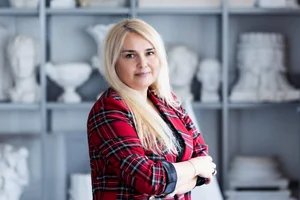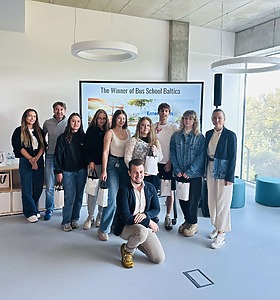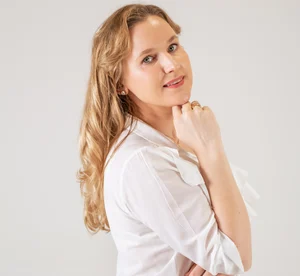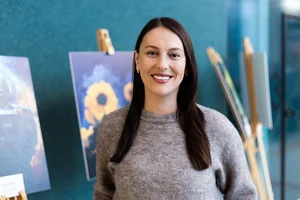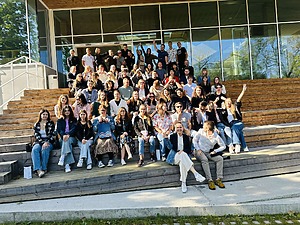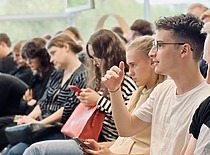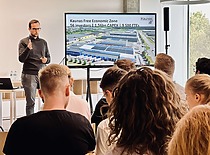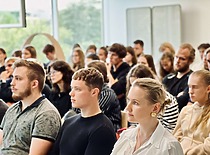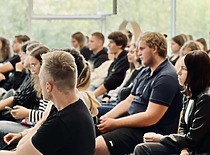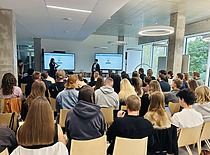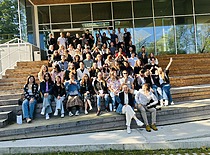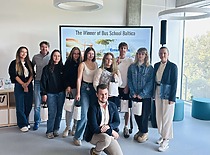This autumn, 60 students from the Baltic region participated in the Bus Baltica programme, visiting Tartu, Riga, and Kaunas. 22 Kaunas University of Technology (KTU) students took part in the training aimed at developing sustainable future urban mobility solutions. Student projects were assessed by the jury, and the award ceremony took place at KTU M-Lab.
During the programme, special attention was paid to the Rail Baltica project, highlighting its potential benefits for regional mobility, urban development, and improving the connectivity of the Baltic States.
Jankauskaitė-Jurevičienė, architect and lecturer at the Kaunas University of Technology Faculty of Civil Engineering and Architecture (KTU FCEA) was one of the jury members assessing the student-developed projects.
Student solutions addressed the complexity of modern travel
During the Bus Baltica program, 10 teams were formed. Each team went through a structured process that included understanding the problem statement, reflecting on personal experiences, identifying marketing opportunities, brainstorming potential solutions, and considering the practical steps needed for implementation. Participants also learned how to build a business model, analysed competitors in the field, and crafted a vision for the future of their ideas.
Bus Baltica aimed to provide both theoretical knowledge and practical application, allowing students to work on real tasks related to future urban mobility and sustainable development.
Beyond selecting the winning team, the jury provided valuable guidance and constructive feedback to all participants, encouraging them to critically evaluate their solutions from multiple perspectives and refine their approaches for real-world application.
Significant contribution to the future development of Rail Baltica
For example, the winning team EnterTrain offered an app for children to be entertained and, most importantly, educated while travelling with trains.
In addition, information provided by the Riga City Council on mobility challenges and solutions in the city was used to further enhance the training.
Training took place in Lithuania, Latvia and Estonia
The event included several presentations by guests. In Kaunas, Tadas Stankevičius, Director at KaunasIn delivered an inspiring talk to the students about the Rail Baltica project in Kaunas. In Riga, students had an opportunity to hear a presentation from a representative from the European Railways Line on Rail Baltica’s impact on Riga and other Baltic cities. The presentation illustrated the potential changes in urban environments and mobility and offered solutions to current challenges.
“The involvement of students in the project is very important and relevant because the students of today will be the future users of the new infrastructure,” commented Marģerts Počs, representative of the European Railway Line, “Also, students always have fresh, innovative and non-standard ideas, which are very important to make the new high-speed railway a modern transport infrastructure.”
Bus-Baltica project organisers extend their thanks to all the parties involved: the project funders EIT Urban Mobility, jury members (Gytautas Kulakauskas, Kaunas Startup Ecosystem Facilitator at KaunasIn, Dr Neringa Gerulaitienė, Bus-Baltica project leader at KTU; dr. Meda Andrijauskienė, Vice-Dean for Research at KTU SEB; Laura Jankauskaitė-Jurevičienė, lecturer at KTU FCEA), trainers from Kimitisik, and project partners from The University of Tartu, Riga Technical University and the Kaunas University of Technology.
Acknowledgment: The project was co-funded by EIT Urban Mobility, supporting its mission to drive innovation and sustainable solutions in urban mobility.


